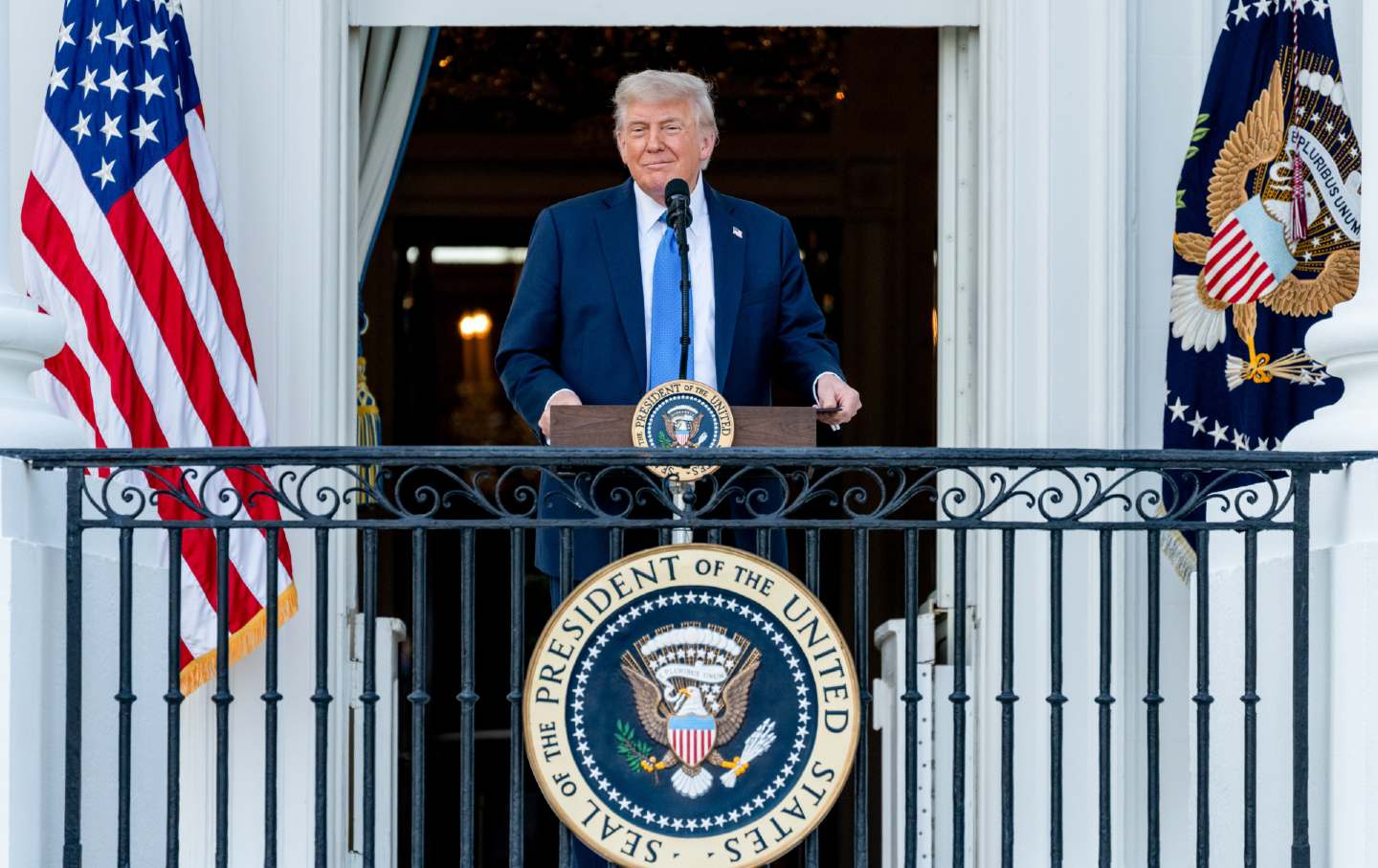Sanford Levinson maintains that a peaceful breakup would be preferable to a divided polity, while Tarence Ray argues that the working class must remain united across state lines.

Yes!
I am a lawyer and a political scientist. Were I to answer this question solely as a lawyer, I would easily say yes. The United States was (or were?) born as a secessionist movement from the British Empire. It was not a “revolution” as we understand the word today. George Washington and his armies had no designs on London; those we call “patriots” simply wanted to withdraw from the existing framework of governance. Taking a cue from the founding of the United States, blue states can legally secede from the Union.
Perhaps the most audacious phrase in the Declaration of Independence occurs in the first sentence, when it purports to speak in the name of “one people.” Any historian—and, one suspects, most of those in Philadelphia gathered at the Second Continental Congress—knew this was, at best, tendentious if not preposterous. Think only of the Indigenous nations, many of whom understandably supported the British, not to mention enslaved people (and peoples). Puritan sectarians in New England had little in common with Baptist sectarians in Virginia, and both were antagonistic to the Catholics in Maryland. (Though initially settled by Catholics, Maryland banned them from holding office in its 1776 state constitution.)
Everyone knows the declaration’s endorsement of “inalienable rights.” But just as important is the sentence emphasizing that the “people”—whose “consent” is the basis of any “just powers” in government—retain the right “whenever any form of government becomes destructive of these ends…to alter or to abolish it.” They remain free to “institute a new government…as to them shall seem most likely to effect their safety and happiness.” This expresses the true radicalism of what most people call the American Revolution.
There has never been a singular American people. This is the real meaning of American federalism, which makes sense only if one recognizes the deep diversity within the American populace. That pluralistic reality sets the stage for equally deep political conflicts, not all of them capable of peaceful resolution within the existing framework of government. Consider, most obviously, the American Civil War. I do not support the Confederate secessionists of 1861, but not because they wanted to leave the union. Rather, my opposition is based on why they wanted to split: the commitment to a vicious and indefensible system of white supremacy and chattel slavery. Appomattox may have settled the issue of slavery; that is not the same as settling the legal issue of secession.
Almost no one opposes every secessionist movement, whether in the distant past—beginning with American secession from the British Empire—or in more recent times, such as the secession of members of the Union of Soviet Socialist Republics (as allowed by Article 72 of its 1977 Constitution), of Great Britain from the European Union, or of Slovenia from Yugoslavia. As Justice Oliver Wendell Holmes argued, general principles do not decide concrete cases. Context and complexity are all-important. So as a lawyer and an extremely concerned citizen of the United States in 2025, I have little hesitation in suggesting that a peaceful breakup of the existing union would be preferable to a divided polity in which there is neither fraternity nor sorority, but only enmity at those perceived, often accurately, as enemies.
But as a political scientist, I cannot conceive of an amicable separation. A principal reason is that the polarization that distinguishes the United States today is not regional, as was the case in 1860. Take my own state of Texas, which I describe as an extremely blue state—mostly composed of five of the 20 largest cities in the country—that is embedded within an equally committed red state outside of these cities. Similar stories of sharp divisions between urban and exurban or rural areas could be told about almost all of the states. Should Texas attempt to leave the union at the behest of the ultraconservatives who currently dominate the state’s politics, an immediate response might well be secessionist movements by the millions of Texans living in Houston and Austin. Similarly, should liberals spearhead secession in “Pacifica,” an imagined nation of West Coast states, one might expect a similar counter-response from eastern Oregonians who are already trying to move their counties to the more convivial political atmosphere they identify with Idaho.
If we applaud Abraham Lincoln’s decision to go to war—and accept what became almost 700,000 deaths between 1861 and 1865—it should be because that war was necessary to end slavery. Had Lincoln merely preserved the union with slavery intact—which, to the disgust of Frederick Douglass, he pledged to do in his first inaugural address—it would not have been worth it. How transcendently important is the preservation of the union today? Any answer lies far more in our political commitments than in the abstract arguments of lawyers.
Sanford Levinson
No!
Blue-state secession is a fun thought experiment—an entertaining form of escapism from the stagnation of US politics—but in practice, such a schism would be costly, debilitating, and ideologically incoherent. Most of all, if the United States is to stand a chance in the face of climate cataclysm and the rise of xenophobic nationalism, the country’s working class must remain united across state lines. The Western Hemisphere needs fewer borders, not more.
By itself, a blue-state secession doesn’t advance a political vision beyond, perhaps, disapproval of President Donald Trump’s authoritarianism. This is a noble cause, of course, but it is not a positive articulation of principles, and as such, it wouldn’t be enough to hold a new nation together—and that is assuming a geographically disconnected state could successfully stave off a military siege by Trump’s federal government in the first place.
And who would, or even could, lead such a movement? After all, many blue-state leaders want some of the same things that red-state leaders want, just in different measure. California Governor Gavin Newsom is pressing California’s cities to ban homeless encampments and has said that it’s “deeply unfair” for transgender athletes to compete in women’s sports. New York Governor Kathy Hochul has rejected popular demands to increase taxes on her state’s wealthiest residents and has failed to implement climate mitigation laws and criminal justice reforms.
Popular
“swipe left below to view more authors”Swipe →
Other blue-state leaders, like Minnesota Governor Tim Walz and Connecticut Senator Chris Murphy, have outlined the beginnings of a political vision that is distinct from red-state America’s but that also accounts for the experience of living in a red state. They seem to understand that something strange and grotesque is happening in the red states that has allowed for the elevation of a despotic leader like Trump. They can pinpoint deindustrialization, the opioid epidemic, and fiscal austerity, and they usually advocate for a return to New Deal–type social-welfare progressivism to fight back. But such politicians typically come up short on issues like Palestinian and immigrant rights. And this is because blue-state leaders have failed to apprehend the most crucial crises before us.
The two defining issues of our time are Palestinian liberation and climate catastrophe. Neither can be addressed through secession: Ecological crises recognize no state boundaries, and the Palestinian cause is bound up with US imperialism. The biosphere, the neoliberal system, and the postwar global framework for human rights are all collapsing, ushering in an era of mass extermination and migration.
The global nature of this upheaval is reflected in how the Trump administration is attacking the US Constitution: The White House has launched assaults on free speech as it relates to Israel and on due process as it relates to immigration status. It is no coincidence that the administration is also using these as precedents for challenging birthright citizenship, a right secured in the 14th Amendment and passed during Reconstruction.
Given the scale of injustices under the Trump administration, what is needed now is an abolitionism for the 21st century—not a campaign for secession. Today’s abolitionist movement would include three causes: 1) The revival and expansion of Reconstructionist ideals to fight for immigrant personhood. 2) Full reparations and ecological rights for Indigenous populations like Native Americans and Palestinians. 3) A head-on confrontation with the fossil fuel industry.
Blue-state secession would not offer any of this. At most, it would offer retribution against the red states, which are on the front lines of the nation’s preeminent crisis: the fallout from an empire in decline. It is worth noting that the political economy of red states is largely the result of the practices of 20th-century US imperialism—anti-communism, the financialization of the imperial economy, and the subsequent raiding of the Global South’s labor and resources—returning home.
These red states even resemble the Global South in some interesting ways. As the United States’ primary source of raw resources and cheap domestic labor, red states have seen their relationships with the land and with labor drastically disfigured. Their working class comprises not only undocumented migrants but also US citizens pushed out of the formal economy through deindustrialization and addiction. These workers should not be punished for the sins of their states’ bourgeois and petty-bourgeois classes, which have opted to drag these states back into the racist, misogynistic ideologies that consolidated the slavers’ power 150 years ago.
The best way to strive for a better future is not to cleave the country’s working class in two and pit its members against each other; it’s to keep working to unite them. Only then will we be able to grapple with the challenges ahead of us.
Tarence Ray





























